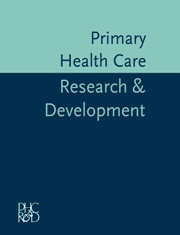
Primary Health Care Research and Development
Scope & Guideline
Pioneering new frontiers in primary health care research.
Introduction
Aims and Scopes
- Primary Care Service Delivery:
Focuses on the evaluation and improvement of primary care service delivery models, including access, quality, and patient outcomes. - Patient-Centered Research:
Emphasizes the importance of understanding patient experiences and preferences to improve health care delivery and outcomes. - Chronic Disease Management:
Explores strategies and interventions for managing chronic diseases within primary care settings, highlighting multidisciplinary approaches. - Health Systems and Policy Analysis:
Investigates the organization, financing, and policies impacting primary health care systems, including the role of social determinants of health. - Innovative Health Interventions:
Promotes research on new interventions and technologies in primary care, including telehealth, digital health, and collaborative care models. - Cultural Competence in Health Care:
Addresses the need for culturally sensitive practices in primary care, particularly in diverse populations and underserved communities.
Trending and Emerging
- Telehealth and Remote Care:
The COVID-19 pandemic has accelerated interest in telehealth and remote care solutions, leading to a surge in research on their effectiveness and implementation in primary care. - Interprofessional Collaboration:
There is an increasing focus on interprofessional teamwork in primary care, highlighting the benefits of collaborative practice in managing complex patient needs. - Mental Health Integration:
Research on integrating mental health care into primary care settings is emerging as a critical area, addressing the comorbidity of physical and mental health conditions. - Patient Engagement and Empowerment:
Studies exploring strategies to enhance patient engagement and empower individuals in their health care decisions are gaining prominence, reflecting a shift towards patient-centered care. - Health Disparities and Equity:
A growing body of research is focused on understanding and addressing health disparities, particularly in marginalized and underserved populations, emphasizing social determinants of health.
Declining or Waning
- Traditional Disease-Specific Studies:
There is a noticeable decrease in studies focusing solely on single diseases without considering the broader context of primary health care and multidisciplinary approaches. - Generic Health Education Programs:
Research on generic health education programs has diminished, as the focus has shifted towards more tailored and context-specific interventions. - Static Health Policy Research:
The emphasis on static models of health policy analysis is waning, as there is a growing recognition of the need for adaptive and responsive health policies that can address dynamic health challenges. - Basic Healthcare Access Studies:
While access remains a critical issue, studies that do not incorporate innovative solutions or community engagement aspects are being published less frequently.
Similar Journals
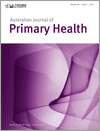
Australian Journal of Primary Health
Advancing Knowledge in Primary Health and PolicyWelcome to the Australian Journal of Primary Health, a vital resource for researchers and practitioners in the evolving fields of health policy and public health. Published by CSIRO PUBLISHING, this journal has established itself as a significant platform for sharing groundbreaking research and insights since its inception in 2001. With an ISSN of 1448-7527 and an E-ISSN of 1836-7399, it provides scholarly articles addressing crucial topics in health policy and public health, and is recognized in 2023 as a Q3 journal in both domains. While it currently does not offer open access, the journal is committed to disseminating high-quality, peer-reviewed research that informs health practices and policies across Australia and beyond. By contributing to the conference of academic knowledge, the Australian Journal of Primary Health plays an essential role in enhancing the understanding of health systems and influencing health outcomes, making it indispensable for students, researchers, and health professionals alike.

JOURNAL OF FAMILY PRACTICE
Elevating the standard of family practice one study at a time.Welcome to the Journal of Family Practice, a premier publication devoted to exploring the multifaceted field of family medicine. Established in 1974 and published by Dowden Health Media, this journal serves as a vital platform for researchers, healthcare professionals, and students who are dedicated to advancing the knowledge and practice of family medicine. With a current impact factor reflected in its 2023 rankings of Q3 in Family Practice and Q4 in Medicine (miscellaneous), the journal is instrumental in disseminating high-quality research that informs clinical practice and health policy. Although the Journal of Family Practice does not offer open access, it provides critical insights that shape best practices and enhance patient care in diverse family healthcare settings. The journal continues to thrive, encouraging submissions that push the boundaries of knowledge within the field and rigorously review studies that assess innovative approaches, evidence-based practices, and emerging trends in family medicine.
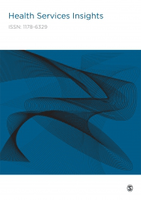
Health Services Insights
Empowering health policy through innovative research.Health Services Insights is a prestigious, open-access journal published by SAGE Publications Inc. Based in the United Kingdom, this journal has become a vital resource for researchers and professionals in the fields of Health Policy and Public Health. Since its inception in 2008, Health Services Insights has consistently aimed to disseminate high-quality, peer-reviewed research that informs practice and policy in health service delivery and management. With an impressive Q1 ranking in both its categories as of 2023, and a respectable Scopus ranking positioning it within the upper percentiles of its fields, the journal continues to attract influential contributions from global experts. Its open-access format, established in 2013, ensures that vital insights on health services are accessible to all, facilitating knowledge sharing and collaboration among researchers, practitioners, and students alike. By focusing on impactful research and innovation, Health Services Insights plays a crucial role in addressing contemporary challenges in health services and improving health outcomes worldwide.

Family Medicine and Primary Care Review
Empowering healthcare professionals with essential insights.Family Medicine and Primary Care Review, published by TERMEDIA PUBLISHING HOUSE LTD, is a significant open-access journal dedicated to advancing the field of primary care and family medicine. Since its inception in 2006, the journal has fostered an environment for the dissemination of innovative research, clinical practices, and reviews relevant to general medicine, securing its place within the Q4 category in the 2023 journal rankings. With an emphasis on accessibility since 2008, it aims to bridge gaps in medical knowledge and practice, contributing to the global conversation on healthcare delivery. Located in Poland, the journal serves as a valuable resource for researchers, healthcare professionals, and students alike, providing insights and developments that shape the future of primary care. With a Scopus rank of #317 out of 636 in the field of general medicine, it stands as a credible source of information for those committed to improving health outcomes in local and international communities.
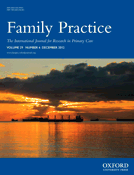
FAMILY PRACTICE
Transforming family medicine with impactful research.FAMILY PRACTICE is a premier peer-reviewed journal dedicated to advancing the field of family medicine, published by Oxford University Press. Established in 1984 and continuing its influential discourse into 2024, the journal holds an esteemed position in the academic community, as evidenced by its classification in the Q1 quartile for Family Practice, ranking 10th out of 56 in this category according to Scopus. With an impressive impact factor and a commitment to disseminating high-quality research, FAMILY PRACTICE serves as an essential resource for researchers, clinicians, and students alike, striving to enhance practice and education in family medicine through evidence-based insights and innovative practices. While the journal maintains a traditional subscription model, it supports broad dissemination of knowledge that contributes significantly to the evolving landscape of healthcare in the United Kingdom and beyond.

Australian Journal of General Practice
Transforming Healthcare Through Evidence-Based ResearchThe Australian Journal of General Practice, published by the Royal Australian College of General Practitioners, serves as a leading platform for the dissemination of high-quality research and insights in the field of family practice. With an E-ISSN of 2208-7958 and a notable impact factor reflecting its rigorous peer-review process, this open-access journal provides researchers, practitioners, and students in Australia and beyond with accessible content that enhances clinical knowledge and practice. While categorized in Q2 for Family Practice and Q3 for Medicine (miscellaneous), it remains steadfast in its commitment to addressing pertinent issues in general practice. As the journal converges its scope from 2018 to 2024, it continues to foster innovation and collaboration within the field, making it an essential resource for those striving to improve patient care and outcomes in diverse settings.

Journal of Primary Health Care
Connecting research and practice to improve health outcomes.Journal of Primary Health Care, published by CSIRO PUBLISHING, is a premier open-access journal dedicated to advancing the field of primary health care since its inception in 2009. With an E-ISSN of 1172-6156, the journal serves as a vital platform for disseminating innovative research and practices that improve health outcomes across diverse populations. Featuring a robust H-index and notable rankings—including Q2 in Family Practice and Q3 in both Medicine (miscellaneous) and Public Health—this journal holds a significant position within the academic community, offering valuable insights to researchers, practitioners, and students alike. By providing open-access options, the Journal of Primary Health Care ensures that its findings are accessible to a global audience, promoting collaboration and knowledge sharing. As we look toward 2024, we invite contributors to be part of this dynamic conversation, addressing the critical issues in primary health care delivery and policy.
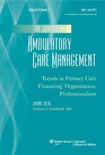
JOURNAL OF AMBULATORY CARE MANAGEMENT
Shaping the future of healthcare with evidence-based research.JOURNAL OF AMBULATORY CARE MANAGEMENT, published by Lippincott Williams & Wilkins, is a leading peer-reviewed journal dedicated to advancing research and practice in the field of health policy, with a specific focus on ambulatory care management. Since its inception in 1978, this journal has served as a critical platform for disseminating innovative studies, insights, and methodologies that inform policy makers, healthcare professionals, and academic researchers alike. By maintaining an impressive ranking within the Q3 category in Health Policy and a Scopus rank of 148 out of 310, it underscores the journal's growing influence in shaping health policy discussions and decisions. The journal operates on a traditional subscription model, ensuring a high-quality review process while remaining accessible to those wishing to subscribe. With an ongoing commitment to excellence, the JOURNAL OF AMBULATORY CARE MANAGEMENT is essential for anyone involved in improving outcomes in ambulatory care settings and influencing health policy reforms, making it a must-read for researchers, practitioners, and students aiming to stay at the forefront of healthcare innovation.

CANADIAN FAMILY PHYSICIAN
Cultivating Excellence in Family Medicine EducationCanadian Family Physician, an esteemed journal published by College of Family Physicians Canada, is dedicated to advancing the field of family medicine. With a rich history spanning from 1977 to 2024, this journal provides a vital platform for scholars, practitioners, and students interested in family practice and its impact on general health. Though it does not currently offer open access, its rigorous peer-reviewed content contributes to its robust reputation, evidenced by its ranking in the top quartile (Q2) for Family Practice and its solid presence in the Q3 category for miscellaneous medicine as per the 2023 rankings. The journal plays a crucial role in disseminating valuable research findings, clinical insights, and innovative practices that enhance patient care in a Canadian context. By bridging the gap between research and practical application, Canadian Family Physician continues to be a significant resource for health professionals seeking to improve their knowledge and skills in family medicine, thereby fostering improved health outcomes across communities.
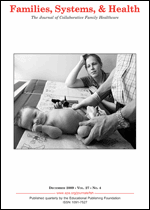
Families Systems & Health
Innovating practices to enhance family health outcomes.Families Systems & Health is a pivotal journal published by the Educational Publishing Foundation of the American Psychological Association, focusing on the intersection of family dynamics and health outcomes. Established in 1996, this peer-reviewed journal provides a platform for researchers, practitioners, and students to explore and disseminate innovative research findings, theoretical frameworks, and applied practices that enhance our understanding of family systems in relation to health and mental health. With a current impact factor situated within the 27th percentile for its categories of Applied Psychology and Psychiatry and Mental Health, Families Systems & Health remains a crucial resource for professionals seeking to apply family-oriented approaches in clinical settings. As the journal continues to evolve through its converged publishing years, it aims to contribute significantly to the empirical dialogue surrounding the health of families, ultimately fostering advancements in both academic research and practical applications. Access to the journal is not open, ensuring a curated dissemination of quality research that emphasizes its commitment to advancing knowledge in this essential field.